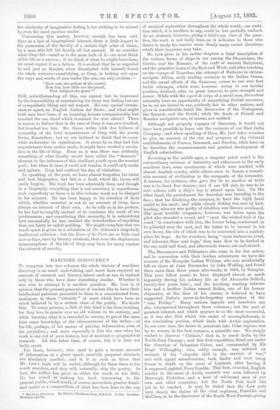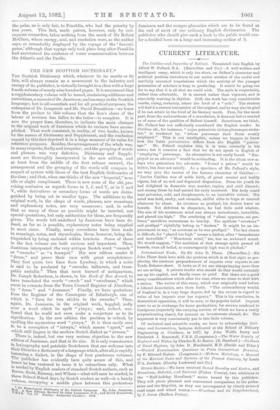MARITIME DISCOVERY.*
To compress into two volumes the whole history of maritime discovery is no small undertaking, and must have required an amount of research and literary labour such as can be realised only by those who have done something similar. Whether it was wise to attempt it is another question. Mr. Low is of opinion that the present generation of readers like to have their intellectual pabulum presented to them in a concentrated form, analogous to those " extracts " of meat which have been so much believed in by a certain class of the public. We doubt this. To many persons, a dish of this kind is far from inviting, for they love to ponder over an old volume in its entirety, and while learning what it is intended to convey, to get at the same time some knowledge of the idiosyncrasies of the writer,—of his life, perhaps, of his means of gaining information, even of his prejudices ; and more especially is this the case when his work is one not of pure history, but of nautical or geographical research. All this takes time, of course, but it is time not badly spent.
For those, however, who need to gain a certain amount of information at a given speed, carefully prepared abstracts are absolutely needful ; and it is to such as these that Mr. Low's book will be useful, although for them there is too much anecdote, and they will, naturally, skip the poetry. In fact, the author has given us either too much or too little, He has aimed at making his book interesting to the general public, which would, of course, necessitate greater detail and useful as a compendium. of what has been done in the way
• Maritime Discovery. By Charles Rathbone Low, F.R.G.S. 2 vols. London : Newman and Co.
of nautical exploration throughout the whole world,—an ambi- tion which, it is needless to say, could be but partially realised. As an abstract, however, giving a bird's-eye view of the ques- tion, the work is not badly done, as it indicates to those who desire to study the matter more closely many varied directions which their inquiries may take.
Mr. Low gives in his earlier chapters a brief description of the various forms of ships in use among the Phoenicians, the Greeks, and the Romans, of the craft of ancient Babylonia, and the primitive boats of the East and West; and after touching on the voyage of Nearchus, the attempt of Eudoxus to circum- navigate Africa, early trading ventures to the Indian Ocean, and the naval efforts of the Saracens, comes to our own first feeble attempts, which were, however, owing to our insular position, destined, after no great interval, to gain strength and power. While with the esprit de corps of a naval man, the author naturally loses no opportunity of magnifying British successes, he is, we are bound to say, perfectly fair to other nations, and gives in considerable detail the discoveries of the Portuguese, the Spanish, and the Dutch; while the deeds of French and Russian navigators are, of course, not omitted.
Although not properly voyages of discovery, it would not have been possible to leave out the ventures of our East India Company ; and when speaking of them, Mr. Low takes occasion to give an account of the rise and progress of the Oriental establishments of France, Denmark, and Sweden, while later on he describes the commencement and gradual development of English colonisation.
Reverting to the middle ages, a singular point noted is the extraordinary mixture of barbarity and refinement in the early maritime laws, some enactments of which were marked with almost fiendish cruelty, while others seem to denote a remark- able amount of civilisation in the occupants of the forecastle. A seaman, for instance, who gave the lie to another at table was to be fined four deniers ; and if one fell sick, he was to be sent ashore, with a ship's boy to attend upon him. On the other hand, the punishment for desertion was branding in the face ; that for falsifying the compass, to have the right hand nailed to the mast; and while simple rioting was met by keel- hauling, whoever was guilty of rebellion was thrown overboard. The most terrible vengeance, however, was taken upon the pilot who stranded a vessel, and "upon the wicked lord of the coast" in connivance with him, the former being condemned to be gibbeted near the spot, and the latter to be burned in his own house, the site of which was to be converted into a market- place for hogs. As for wreckers, being "more barbarous, cruel, and inhuman than mad dogs," they were first to be ducked in the sea until half dead, and afterwards drawn out and stoned.
The Buccaneers and Filibusters also come in for due notice, and in connection with their lawless adventures we have the account of the Mosquito Indian William, who was accidentally left on shore at Juan Fernandez by John Watling, and found there more than three years afterwards, in 1684, by Dampier. This poor fellow seems to have displayed almost as much ingenuity duriug his , solitary life as did Alexander Selkirk, twenty-five years later ; and the touching meeting between him and a brother Indian named Robin, one of his former shipmates, at the time of his rescue, is believed to have suggested Defoe's never-to-be-forgotten conception of the " man Friday." Many curious legends and anecdotes are also interspersed throughout these volumes ; but the part of greatest interest, and which appears to us the most successful, as it was also that which was easier of accomplishment, is the concluding portion, which deals with Arctic exploration. In our own case, the desire to penetrate into Polar regions was by no means, in the first instance, a scientific one. We simply wished to discover " Cathaie," that is, to reach India by the North-East Passage ; and this first expedition, fitted out under the direction of Sebastian Cabot, and commanded by Sir Hugh Willoughby, who, oddly enough, was selected on account of his " singular skill in the services of war," met with signal misadventure, both leader and crew being frozen to death on the coast of Lapland, after having, it is supposed, sighted Nova Zembla. This first, recorded, English martyr in the cause of Arctic research was soon followed by Kurrough, Frobisher, and a host of celebrated men of our own and other countries ; but the North Pole itself has yet to be reached. It may be stated that Mr. Low puts very clearly the claims of the rival explorers, Franklin and McClure, to be the discoverer of the North-West Passage, giving
the palm, as is only fair, to Franklin, who had the priority by two years. This fact, made patent, however, only by sub- sequent researches, takes nothing from the merit of Sir Robert McClure, whose energy, zeal, and resolution were, as the author says, so remarkably displayed by the voyage of the Investi- gator,' although that voyage only took place long after Franklin had ascertained the existence of water communication between the Atlantic and the Pacific.































 Previous page
Previous page